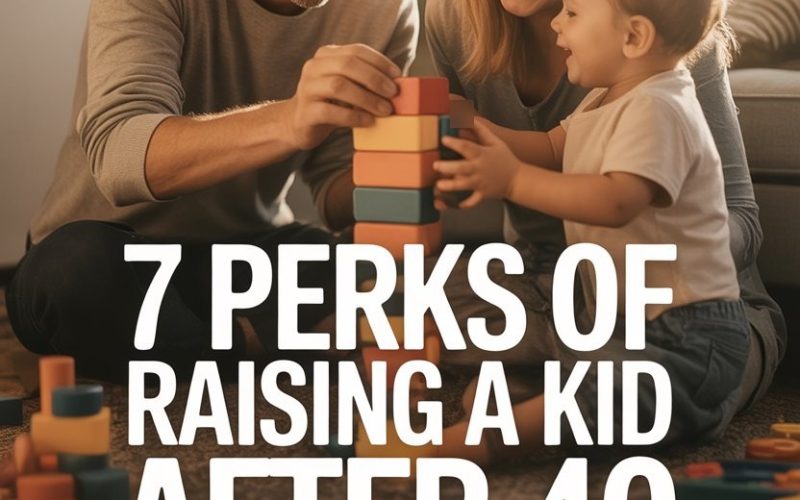When you become a parent after 40, the world has opinions. Some are helpful (“You must have so much patience now!”), others, less so (“Aren’t you exhausted all the time?”).
But between the sideways glances and the endless questions about whether you’re the grandparent, there’s a whole load of perks people overlook.
Here’s a peek behind the scenes, from the trenches of late-in-life parenting.
1. Built-In Wisdom (and a Hefty Dose of Humour)
By the time 40 rolls around, you’ve probably lived through a few life plot twists. Think of all the things you’ve survived: dodgy haircuts, questionable relationships, jobs that made you want to run away to join the circus.
These experiences become your parental superpower.
When your toddler paints the dog blue, your response is less “Why me?” and more “Where did you even find the paint?” Having weathered life’s storms, you learn not to sweat the small stuff (or the blue dogs).
Parenting after 40 often comes with a relaxed approach, a sense of perspective, and—let’s be honest—a better sense of humour about bodily fluids.
Research published in the Journal of Family Psychology notes that older parents often feel more confident in their parenting skills, relying less on others’ opinions and more on their well-earned gut instincts.
Trust that inner compass—you’ve earned it.
2. Financial Stability That Actually Stabilises
Trying to raise a kid while living off instant noodles and hope? Been there, done that, have the faded concert T-shirt to prove it.
Many parents over 40 have had time to build a career, squirrel away savings, or at least figure out what “pension” means.
This doesn’t mean you’re suddenly rolling in it. But paying for nappies, swimming lessons, and the odd unicorn birthday cake tends not to cause instant cardiac arrest.
You may even catch yourself saying things like, “We can afford the good pram”—and then immediately feeling like your own parents.
A study from the London School of Economics found that parents who delay childbearing often report greater happiness, partly because of the financial security they’ve built up.
There’s something to be said for buying nappies without sweating over your debit card balance.
3. Patience Isn’t Just a Virtue—It’s a Survival Tool
Patience in your 20s is a bit like your ability to eat spicy food: overestimated.
After 40, your reserves are deeper, thanks to years of dealing with colleagues, awkward family gatherings, and possibly several rounds of IKEA flat-pack furniture.
When your child goes nuclear because their banana snapped in half, you’re less likely to panic.
Years of navigating adult life have taught you that some things just take time—tantrums, teething, and the mysterious process of getting shoes on tiny feet all included.
Psychologists often highlight the link between age and emotional regulation.
One Harvard Medical School review suggests older parents tend to keep their cool more easily, which rubs off on children. Your zen can become their safe harbour.
4. Stronger Support Network—or the Wisdom to Build One
Parenting after 40 means you know your people. You’ve learned who brings soup when you’re sick and who makes everything about them.
Chances are, you’ve got a network of friends, neighbours, extended family and maybe even an understanding postie.
If not, you know how to build one. Playgroups, online forums, WhatsApp mum squads—older parents often embrace new connections with less self-consciousness.
You’re less worried about being “the cool parent” and more interested in being the one whose coffee cup is always full.
Older parents are more likely to join, and stick with, community-based parenting groups, according to research in Developmental Psychology.
And if your friends’ kids are grown, congratulations: you’ve got a built-in team of experienced babysitters.
5. The Gift of Gravitas (a.k.a. You Don’t Sweat the Small Stuff)
Life’s little dramas don’t seem quite so dramatic anymore. Lost blankies, missing shoes, or the world’s slowest school run? You’ve learned which battles are worth fighting and which are best surrendered with a sigh and a biscuit.
Your “older” status can work in your favour. Teachers, doctors and even fellow parents tend to treat you as a grown-up (sometimes).
Your opinions carry more weight because you’re seen as experienced, even if your only true expertise is in remembering to pack snacks.
A report in the Guardian highlights how older parents often feel more at ease asserting boundaries and advocating for their children. Advocacy skills come with age, not the number of parenting podcasts you’ve binged.
6. A Deeper Appreciation for Every Stage
Anyone who’s become a parent after 40 knows what it’s like to wait, wish and work for a child—sometimes for years.
That brings a certain gratitude to those wobbly first steps and late-night cuddles. You don’t just notice the milestones, you savour them.
Maybe you’re more likely to whip out the camera (and yes, embarrass your child in the process).
Maybe you find yourself genuinely enjoying story time, instead of just trying to get through it before your tea goes cold. The “golden years” cliché starts to make sense.
Studies from Penn State University report that older parents often experience less stress and more joy during early childhood, taking setbacks in stride and soaking up the sweet moments.
Your lived experience becomes the secret ingredient for enjoying the ride.
7. You Get to Be the Unexpected Parent
Here’s the secret nobody talks about: raising a child after 40 means you constantly surprise people—including yourself. You’re living proof that there’s no deadline on starting a family, and that parenting isn’t reserved for the young and restless.
Your child might have to explain to classmates why their dad knows all the words to ‘80s hits, or why their mum is the reigning queen of Trivial Pursuit. Embrace it!
You’ll be the parent who brings wisdom (and maybe snacks) on every field trip, the one who cheers the loudest at sports day, or the one who turns up to playgroup in work boots and a suit jacket.
You show your kids, and everyone else, that love and fun have no expiration date. And when they’re old enough to roll their eyes at you, you’ll be ready—with a wink and a story about “back in my day.”
A Different Kind of Chaos—And That’s a Good Thing
Raising a kid after 40 isn’t always a walk in the park. Some days, it feels more like a jog through a hedge maze, with snacks and plasters in your back pocket.
But the rewards are rich, the laughter is real, and the perspective you bring can turn even the messiest days into memories worth treasuring.
You’ve waited, planned, and lived enough life to know that perfect parenting doesn’t exist.
What does? Being present, learning as you go, and letting your experience shape the kind of parent your child truly needs.
Turns out, 40 might just be the new magic number.




